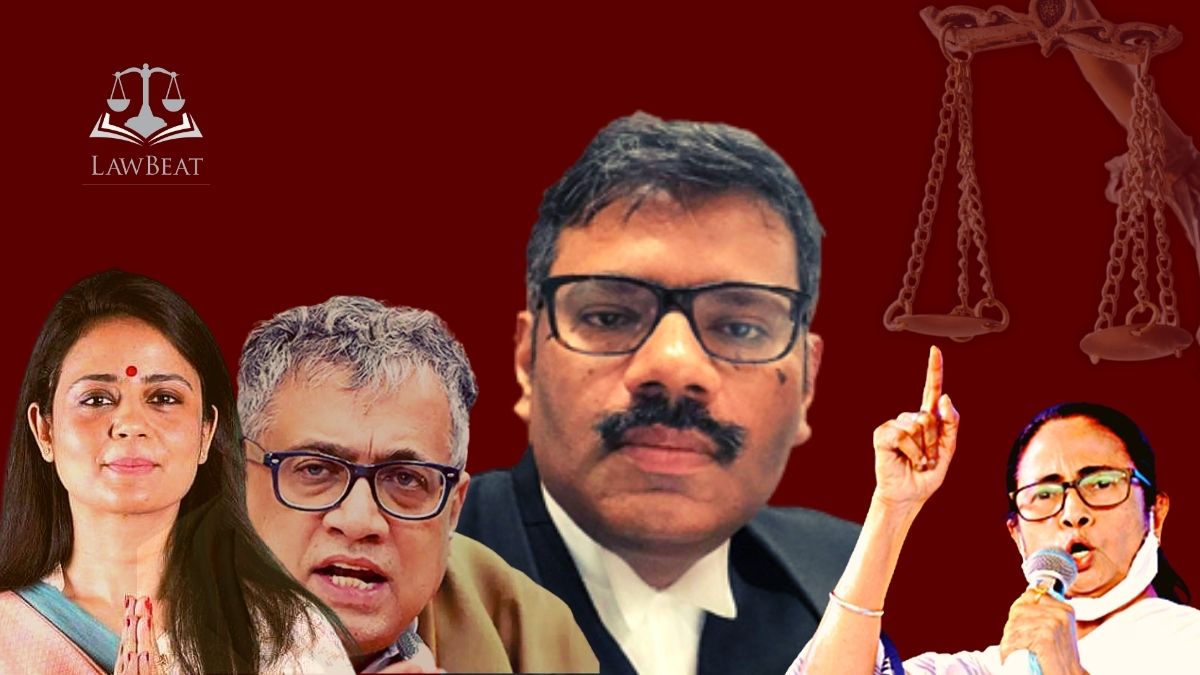Recusal of Justice Chanda: A successfully hatched 'smear' campaign or a dangerous precedent?

On July 7, 2021, LawBeat reported that Hon’ble Mr. Justice Kausik Chanda of the Calcutta High Court had recused from hearing West Bengal’s Chief Minister, Ms. Mamata Banerjee’s election petition challenging BJP’s Mr. Suvendhu Adhikari’s election win from Nandigram in the West Bengal Assembly Elections. Concomitantly, in his recusal order, Justice Chanda had imposed a cost of INR 5,00,000 on Banerjee for indulging in calculated psychological offensives and the vilification adopted by her to seek his recusal.
In a previous column, one of us (Anujay) had argued that Mamata Banerjee’s recusal plea was not only improperly made, but it also failed to meet the threshold for judicial recusal as laid down by various judgments of the Supreme Court. Strangely, while ultimately recusing from the case, Justice Chanda had substantively dealt with Banerjee’s objections and rejected all the contentions raised by Banerjee’s counsels to argue that there is a strong case of recusal of the Hon’ble Judge. To any citizen’s mind, the immediate question which would arise is why did then Justice Chanda recuse? Does this recusal order set a dangerous precedent for future cases involving political implications?
In this article, we shall be answering these intriguing and important questions by critically examining Justice Chanda’s recusal order. We shall also make an attempt to best highlight the peculiarities of this recusal order and its potential dangers as a precedent.
THE RECUSAL ORDER: EXAMINING BANERJEE’S CONTENTIONS:
(A.) A Judge’s prior association to a political party is irrelevant for considering Judicial Recusal
First, Justice Chanda has addressed the contention that he should recuse himself from the case as he was associated with the legal cell of the BJP and had appeared in several cases on behalf of it as a lawyer. Addressing the elephant in the room, he rejects the contention that a ‘conflict of interest’ in the matter arises as he had a “long, close, personal, professional, pecuniary and ideological relationship with a political party”. Such a view, Justice Chanda states, is “too sombre” a view of the integrity of a judge, who has taken the constitutional oath to discharge his duties without any fear or favour.
Justice Chanda then states that the test to be adopted for judicial recusal must be “a real likelihood of bias or real danger of bias”. According to him, the appearance of “impartiality” must not be viewed from the perspective of a “common man” and that it is for the Court to determine whether an “informed reasonable man” would perceive bias in the given facts. Moreover, he holds that ‘pecuniary interest’ is of no relevance in such cases and the interest must be direct, instead of being a remote or tenuous form of interest.
Justice Chanda further holds that “if a lawyer appears in several cases for a political party, his association with the legal cell of the party or with its leaders is natural” [emphasis ours]. He observes that not only is it nearly impossible to find that a person is without some political views at all, anyone with even the tiniest of interest in politics may be said to have an ‘interest’ in a case. Similarly, Judges exercise their voting rights in favour of a political party, yet lay aside their individual predilection while deciding cases. He further adds that advocates train their mind to both not identify themselves with their clients and yet continue to be loyal in their duty to the clients. Building on this statement, he notes that when an advocate moves from the Bar (i.e. Advocacy/Practice) to the Bench (i.e. the Court), they continue the same sense of detachment already in-built in them. Consequently, he holds that it is preposterous to “suggest that a Judge having a past association with a political party as a lawyer should not receive a case involving the said political party or any of its members.”
Further, he points out that if this proposition is allowed to be accepted, the long-lived and deep-rooted notion of “neutrality” associated with the justice delivery system would be destroyed and encourage bench-hunting by unscrupulous litigants.
(B.) Banerjee cannot seek recusal based on her own consent or objections vis-à-vis Judicial Appointments
Next, Justice Chanda lucidly highlights the fact that Banerjee’s own consent or objection to Judicial Appointments to the Higher Judiciary is irrelevant, and cannot be a valid ground to seek judicial recusals. He adds that Banerjee’s own perception and action cannot be grounds to say that a judge is biased.
An excellent point raised by Justice Chanda is that to expect any litigant such as Banerjee (who is a Chief Minister of the State and had the opportunity to put her views on Judicial Appointments to the High Court), would receive a favourable order from a Judge whose appointment was consented to by her, would be ludicrous. In similar vein, the converse belief that Banerjee would receive an unfavourable order from a Judge whose appointment she did not consent to, would be unsound.
Importantly, petitioners such as Banerjee in their capacity of being the Chief Minister of a State, would inevitably have had either objected to or consented to the appointments of most of the Judges of the Hon’ble High Court. Consequently, if Banerjee’s contentions were to be accepted, it would result into an absurd outcome where such election petitions could never be tried before the High Court.
HIGHLY CONFIDENTIAL INFORMATION SHARED PUBLICLY BY BANERJEE:
Justice Chanda has made strong observations on how the proper practice for seeking judicial recusal was not followed by Banerjee. He highlights the fact that as per current principles, the practice to seek judicial recusal is to approach the same Judge for recusal before whom a case is assigned. However, this was not followed in the present case. Instead, Banerjee opted to address her objections to the Acting Chief Justice of the High Court and even deliberately made the objections public.
Notably, the letter contained highly confidential information concerning the appointment of a Judge of the High Court. Given the fact that Banerjee was the Chief Minister of the State, she was bound by her oath of secrecy and constitutionally obliged, to maintain the secrecy of such information. Banerjee’s conduct in publicly sharing such highly confidential information hinted at a desperate bid made to ensure that Justice Chanda’s bench does not hear the case, anyhow or somehow.
WHY WAS THE RECUSAL MADE AND COSTS IMPOSED?
Surprisingly, Justice Chanda stated that he had decided to recuse himself from the case for a different reason, which pertained to perception of the controversy created by the highest echelon of State politics throughout since the inception of the case. He adds that the trial of the case before his bench would be used as a tool by Banerjee and her political party to aggrandize themselves. Consequently, he felt that continuation of such unwarranted squabble which would persist if he were to hear the case would be “contrary to the interest of justice” and such attempts should be thwarted at the threshold.
However, Justice Chanda also imposed costs on Banerjee for the reasons described below. Apart from the leak of highly confidential information and the improper mode of seeking judicial recusal discussed previously, Justice Chanda has made important observations about the conduct of Banerjee and leaders of her political party:
- First, he points out that Banerjee’s counsel Dr. A.M. Singhvi had not filed a formal application seeking his recusal on the first day of hearing.
- Second, after the first hearing, he notes that “The script was already prepared; the dramatis personae were ready to launch a well-rehearsed drama outside the Court.” As per reports, a tweet by TMC Rajya Sabha MP (implicitly referring to Derek O’ Brien), had made snide remarks against Justice Chanda. Notably, the most deplorable remark made by the TMC MP was: “Can the judiciary sink any lower?”.
- Third, Justice Chanda mentions another tweet (implicitly referring to Mahua Moitra), who had posted adverse remarks against Justice Chanda stating: “Milord- get a conscience or at least a better veil! Mamatadi’s Nandigram petition listed before Justice Kausik Chandra, member of BJP’s legal cell & BJP lawyer in numerous appearances… Save our judiciary!”, along with posting a list of purported cases where Justice Chanda had represented BJP. Similarly, other state leaders of TMC had come up before media to demand the recusal. Collectively, all these actions created a nationwide controversy in the media.
Cumulatively all of these events, along with the leak of highly confidential information pertaining to Justice Chanda’s judicial appointment by Banerjee, clearly demonstrated that a deliberate and conscious attempt was made to influence his recusal.
This affirms the “calculated psychological offences and vilification adopted” by Banerjee to seek the judicial recusal, which must be “firmly repulsed”. Consequently, Justice Chanda imposed a cost of INR 5,00,000 on Banerjee, directing her to deposit the amount within two weeks to the Bar Council of West Bengal, which shall be used for families of advocates who had succumbed to COVID-19.
PECULIARITIES WITH THE ORDER:
There are certain peculiarities with the recusal order, which shall be discussed step-by-step below.
1. No mention of the Supreme Court’s Constitution Bench Orders on Judicial Recusal
In his order, Justice Chanda states that whenever a Judge is faced with a recusal petition on the ground of bias, he should not question himself about whether he is biased to a litigant or not. The limited query which he should make is “whether the facts of the case can really give rise to the litigant’s mind a reasonable apprehension of bias.” He adds that a judge should satisfy himself as to “whether in the given facts before him, a reasonable man would apprehend bias.”
Curiously, the standard on judicial recusal referred to by Justice Chanda seems to be based on case-laws prior to the Five-Judge Constitution Bench orders of the Supreme Court in the cases of Supreme Court Advocates-on-Record Association vs. Union of India (Recusal Matter), (2016) 5 SCC 808, and Indore Development Authority vs. Manohar Lal, S.L.P. (Civ.) Nos. 9036-9038/2016. As per these orders, which are the current governing laws on judicial recusals, it is completely left to a judge to decide whether or not she/he should recuse from a particular case. This stricter standard on judges which sought to decrease judicial recusals arose from the malpractices indulged into by litigants such as bench-hunting, forum shopping, seeking a favourable judge, or brow-beating the court. It is perplexing that the recusal order does not refer to these judgments, whose legal position implicitly overrules the previous Supreme Court decisions by benches of smaller strength.
If Justice Chanda had determined that none of Banerjee’s contentions met the legal threshold to satisfy that there was a ‘conflict of interest’ or ‘bias’ in the present case, then Justice Chanda should have opted to not recuse from the case in order to fulfil the constitutional oath to perform his duties without any fear or succumbing to pressures of bench hunting, as iterated by the law on conduct of judges while dealing with judicial recusal pleas by the Supreme Court in Seema Sapra vs. Court On Its Own Motion, 2019 SCC OnLine 1392. His recusal citing the creation of a media trial by Banerjee and her political party, as well as the calculated psychological offensives used arguably create an impression in mind of an informed citizen that this duty was not fulfilled in the present case.
2. Concerns of Media Trial and Judicial Independence
Even before the recusal order, Justice Chanda was reported to have made oral remarks flagging concerns on media trialhappening around the then pending plea for his recusal. As we have previously seen, his recusal order strongly reflects on the way a media trial was made during the course of his adjudication on the then pending recusal petition and was devised to be such from the very beginning.
Social media serves as a very convenient platform for such media trials, especially due to the amplification of similar voices and the spread of ‘information’ like a wildfire. It helps lay a fertile ground for manufacturing cacophony around the handling of politically sensitive cases and for drumming up support for perceived ‘victims’, thus creating pressure on the judiciary. Given that the present case was before a single-judge bench, pressurizing Justice Chanda was all the more easier, through accusations of biasness favouring a particular political party.
As Justice Chanda noted in the order, not only was a well-thought smear campaign to stir up a nationwide controversy resulting in his recusal chalked out by posting on social media, several leaders of TMC also went before the mainstream media demanding such recusal. The attempt was to intentionally orchestrate a “public perception” of the possibility of biasness on part of Justice Chanda. It should be highlighted that the game-plan did not stop here. TMC workers reportedly went to the extent of demanding the removal of Calcutta High Court’s Acting Chief Justice! They even further made a ridiculous demand of removing Solicitor General, Mr. Tushar Mehta, and Mamata’s faithful generals wrote a letter to the President of India to that effect.
If Justice Chanda was aware of TMC party leaders’ tweets, it may be safely assumed that he must have been aware of these ludicrous acts as well. When it was clear to the Hon’ble Justice that it was a craftily hatched plan, he shouldn’t have recused himself, thus driving it to its logical conclusion. Notwithstanding his acknowledgement and lashing of the same, this order has set a dangerous precedent wherein legal issues having high political stakes can be tilted in one’s favour by arm-twisting the judiciary. If the petitioner was ultimately allowed to forcefully manoeuvre her way by mudslinging and labelling, the harsh criticisms made in the order are rendered nullified with barely any practical consequences. It must be realized by the Bar and Bench those hounding judges in this manner that judicial acts such as recusals in politically charged cases without any reasonable, actual grounds meriting such recusals are detrimental to judicial independence. Such acts negatively affect the public perception of judicial accountability and send a message that judges are not adjudicating without fear or free from pressure.
3. Was imposition of fine on Banerjee the best approach forward?
The slapping of a fine of INR 5,00,000 on the petitioner, and the direction of its use for Covid affected families is a commendable move on part of Justice Chanda, but does not suffice as a penalty. Viewed as costs imposed for wasting the Hon’ble court’s time and energy, it may be a reasonable fine but doesn’t seem to be capable of having a deterrent effect on potential offenders. Reason being, the amount is symbolically a not even a fraction of the funds that political parties and leaders have. Mamata Banerjee is the sitting Chief Minister of West Bengal, and pecuniary help would be offered to her from the party and all influential sections of the society most willingly. One may assess the power and prestige she commands from the fact that she had for herself readily available some of the most expensive Senior Advocates of the country and state, i.e., Dr. A.M. Singhvi and Mr. S.N. Mookherjee respectively. Whether the fine imposed would really matter to her or not, is then anybody’s guess.
Further, given that the petitioner leaked highly confidential information regarding judicial appointments, as well as the fact that her generals lavishly indulged themselves in maligning a sitting judge of the High Court on a significant social media platform such as Twitter (which has recently been in various controversies for its recent), all of them met the conditions required for being held in contempt of the Hon’ble court. Initiation of contempt proceedings against them all would have been the right way forward. The fact that Justice Chanda chose not to serve a show-cause notice on why contempt proceedings should be initiated against Banerjee, as well as the TMC MPs Derek O’ Brien and Mahua Moitra, in spite of the foregoing crystal-clear intentional misconduct on their part, would set a bad example where political parties and political leaders would feel encouraged to repeat such misconducts and malpractices in future to seek judicial recusals, fearing no reprehension from courts.
IN CONCLUSION: A DANGEROUS PRECEDENT?
Justice Chanda’s order intelligibly lays out the reasons for turning down requests for recusal in politically sensitive cases. It states that the case before the bench should be decided on the basis “judicially evolved parameters”, unperturbed by public perception. The comprehensive reasoning sets a reliable precedent to tackle such demands in future. The fact that Justice Chanda took on the mammoth task to lay down an important precedent, answering whether objections raised by Banerjee merit any reason for judicial recusals and answering the same in negative, is immensely applaudable. However, in the ultimate analysis, the recusal of the Hon’ble Judge in itself is a dangerous precedent, because it bolsters the confidence of such bench-hunters or forum shoppers that a favourable order can be acquired, by hook or by crook.
Only in this sense does the order set a bad example.
We hope that in future, our Judges deal with such absurd requests with an iron hand, and don’t shirk from repulsing malpractices engaged by political leaders and political parties, as was egregiously done by Banerjee and TMC leaders in the present case.

[Anujay Shrivastava is a Law Graduate from Jindal Global Law School (JGLS), O.P. Jindal Global University, Sonipat.

Yashowardhan Tiwari is a Graduate Research Immersion Program (GRIP) Scholar and LL.M. Candidate from JGLS.
This column has been written with bona-fide intentions. No disrespect is meant to be caused to the Hon’ble Court, the Hon’ble Judge, or the parties and their lawyers in the present case. Views are strictly personal.]
